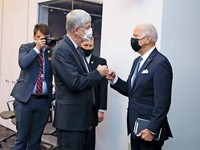Advertisement
Grab your lab coat. Let's get started
Welcome!
Welcome!
Create an account below to get 6 C&EN articles per month, receive newsletters and more - all free.
It seems this is your first time logging in online. Please enter the following information to continue.
As an ACS member you automatically get access to this site. All we need is few more details to create your reading experience.
Not you? Sign in with a different account.
Not you? Sign in with a different account.
ERROR 1
ERROR 1
ERROR 2
ERROR 2
ERROR 2
ERROR 2
ERROR 2
Password and Confirm password must match.
If you have an ACS member number, please enter it here so we can link this account to your membership. (optional)
ERROR 2
ACS values your privacy. By submitting your information, you are gaining access to C&EN and subscribing to our weekly newsletter. We use the information you provide to make your reading experience better, and we will never sell your data to third party members.
Policy
Milestone For European Science
Government: European Research Council marks fifth anniversary in Brussels
by Sarah Everts
March 1, 2012
Four hundred policy makers, scientists, politicians, and journalists wrapped up a two-day meeting in Brussels today celebrating the fifth birthday of the European Research Council (ERC), a pan-European agency that funds research based on scientific excellence.
“After only five years, the ERC can point to a remarkable list of achievements,” said European Union Commissioner for Research & Innovation Máire Geoghegan-Quinn at the anniversary ceremony.
For example, ERC’s 2,500 grant holders have published more than 3,400 research papers acknowledging the agency’s funding, she said. “Indeed, in the course of 2011, every week at least one ERC-funded project reported its findings in either Nature or Science.”
With its funding based only on scientific merit, ERC differs from other European Commission-created funding mechanisms, which allocate money for science based on additional criteria such as equitable distribution of funds across EU member states or government-directed research priorities.
Developing ERC so that its grants are based solely on scientific merit was not a smooth process, noted ERC President Helga Nowotny. “There has always been an inherent tension between the demands of policy-makers for practical innovation and the deeply rooted interests of scientists in curiosity-driven research.”
Maintaining ERC’s merit-based funding is essential because “we cannot program scientific breakthroughs or order them as if from a menu,” Nowotny said. “We simply do not know what we do not know.” She added that the ERC “would not yield” to any pressure to fund science based on any criteria aside from scientific excellence.
ERC initially focused its budget on supporting early-career researchers with five-year grants averaging $1.3 million and established scientists with $3.3 million, five-year grants. The agency is now expanding its grant pool to fund proof-of-concept ideas and collaborative projects.
Scientists of any nationality can apply for ERC grants, provided they are based in or moving to Europe. Although the vast majority of grantees come from EU countries, a handful of recipients originate from countries as diverse as Brazil, Canada, India, and Japan. The 75 American-born grantees far outnumber other international recipients.
When German chemist Anja-Verena Mudring received an ERC grant in 2008, “I was really at the start of my career using ionic liquids to develop energy-efficient materials,” she tells C&EN. “The funding allowed me to follow an unconventional idea, and it also gave me visibility not typically available to early-career scientists.”



Join the conversation
Contact the reporter
Submit a Letter to the Editor for publication
Engage with us on Twitter